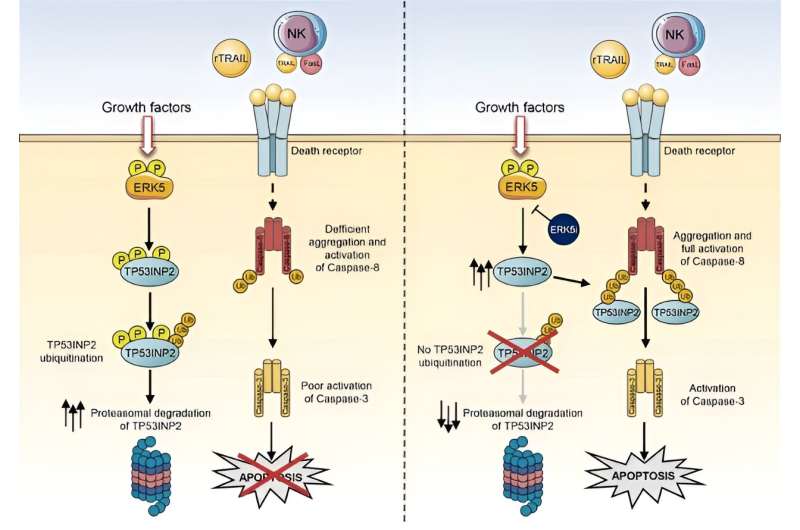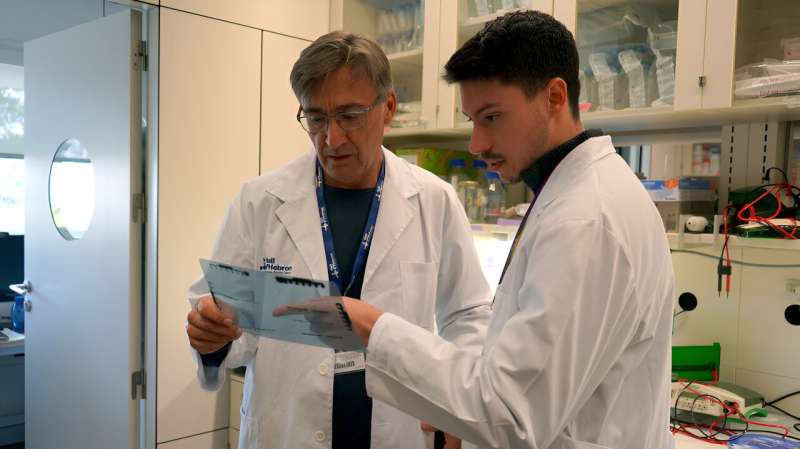This article has been reviewed according to Science X's editorial process and policies. Editors have highlighted the following attributes while ensuring the content's credibility:
fact-checked
trusted source
proofread
Study identifies strategy to avoid resistance to cancer therapy

Resistance to therapies is one of the obstacles to overcome in cancer treatments. Understanding the mechanisms of this resistance is essential to design strategies that favor tumor cell death. A study led by the Protein Kinases and Cancer group of the Vall d'Hebron Research Institute (VHIR), the Department of Biochemistry and Molecular Biology and the Institute of Neurosciences of the Universitat Autònoma de Barcelona (UAB) has deciphered a new mechanism to sensitize cancer cells to a specific therapy that so far has not been effective because of tumor resistance.
The results have been published in the journal Cell Death & Disease, in collaboration with the Biomedical Research in Gynecology group at VHIR, IRB Barcelona and the Hospital del Mar Research Institute.
In recent years, multiple cancer therapies have failed to reach clinical practice. This is the case of TRAIL agonists, molecules that bind to cell membrane TRAIL receptors and trigger apoptotic death. These drugs, despite good results in preclinical phases, have not shown the expected efficacy in clinical trials because of the resistance of tumor cells.
"These therapies would be very promising, since TRAIL receptors are mainly located in cancer cells but not in healthy cells, thus minimizing side effects in healthy cells," says Dr. Sergio Espinosa, researcher of the Protein Kinases and Cancer group at VHIR and UAB and first author of the study.
This research has revealed the molecular mechanism by which cells become resistant to the antitumor action of TRAIL. The current study shows that the protein kinase ERK5 plays a relevant role. "In previous studies we had already shown that ERK5 is involved in cell proliferation and cancer survival, and now we confirm that activation of this protein also confers resistance to treatments that cause cell death," explains Dr. José Miguel Lizcano, head of the Protein Kinases and Cancer group at VHIR, INc-UAB researcher and Professor in the Department of Biochemistry and Molecular Biology at the UAB.
The results show that inhibition of ERK5 with drugs restores the sensitivity of cells to antitumor treatments. "We propose that ERK5 inhibitors improve the anticancer efficacy of TRAIL agonists," adds Dr. Lizcano.

ERK5 inhibition to boost the action of the immune system
To eliminate tumor cells, the action of the immune system is essential. In this regard, a type of immune cell called Natural Killer (NK) has a potent antitumor action, in part due to activation of the TRAIL pathway. The results of this work also show that ERK5 inhibitors would potentiate the anticancer activity of NK cells.
So far, the analysis has been carried out in cell lines from different types of solid tumors, such as prostate, lung, cervical or neuroblastoma cancer, and in 3D cultures and organoids derived from endometrial cancer patients. These organoids are an excellent laboratory replica of a fragment of the patient's tumor, which preserve many of the key features of the original tumor. In the future, the researchers hope to find new collaborations to conduct clinical trials, with the aim of testing ERK5 inhibitors in cancer patients.
More information: Sergio Espinosa-Gil et al, MAP kinase ERK5 modulates cancer cell sensitivity to extrinsic apoptosis induced by death-receptor agonists, Cell Death & Disease (2023). DOI: 10.1038/s41419-023-06229-6



















